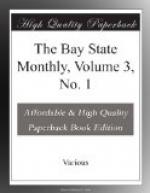From this brief review of the history of our law there is but one conclusion to be drawn, that slowly but surely the doors to divorce have been opened until it has become a comparatively easy matter to obtain that relief which for so many years was absolutely refused. A few statistics will illustrate this: In the year 1863 there were in the state 10,873 marriages and 207 divorces; in 1882 there were 17,684 marriages and 515 divorces, or an increase in the former of 62.6 per cent., and of the latter of 147.6 per cent., while the population of the state increased in the same time 53.4 per cent. Since the legislation of 1870, which, as we have seen above, made divorce obtainable on nine grounds, the increase in the number of decrees granted has been 36 per cent., while in the same period marriages have increased but 20 per cent.
During this twenty years 79 per cent. of all divorces granted were for adultery and desertion, and of those granted for the first-mentioned cause only a trifle over one-half were for the fault of the man; while, contrary to a widely-prevalent belief, the record shows that of the decrees entered for that cause the proportion is greater in the country districts than in our cities. In the same period the highest ratio of divorce to marriage has been one to twenty-three, and the lowest one to thirty-three, the average for the whole time being one to thirty-one; but in Suffolk County, comprising the cities of Boston and Chelsea and the towns of Winthrop and Revere, the average has been only one to forty-one and nine-tenths. These statistics are indeed startling, and may be easily used as a foundation for an argument that our laws governing the matter are far too lenient, since the number of divorces is so apparently excessive.
But on the other hand is it not as fair an inference from all the facts, that beyond and deeper than any provisions of the law there is something wrong in society itself; that we must look for the real root of the trouble in the influences which are operating upon our social life as a people? Our Judges who administer the law are learned, of great experience in the matter of weighing evidence, careful and conscientious. The laws are carefully framed to prevent collusion between the parties, and especially to render it difficult to obtain a divorce for the groundless desertion of the party seeking the separation; in fact they are far in advance of the laws of many of our sister states, and it has been truly said that the divorce laws of this Commonwealth have kept pace with the improved understanding of the condition of the people, and have been wisely framed to meet the many causes which exist in modern life to break up the domestic relations.
There is not one of our statutory causes for divorce which could be stricken out without a certainty of inflicting legal cruelty in the future. Of all our divorces nearly seventy per cent, are upon petition of the wife; and it can be safely said that nearly all will agree that to compel a woman to submit to the cruelty and brutalities of a drunken or profligate husband, is not only inflicting upon her legal cruelty, but has an influence which extends beyond the individual and is powerful for evil upon those who are to come after us.




